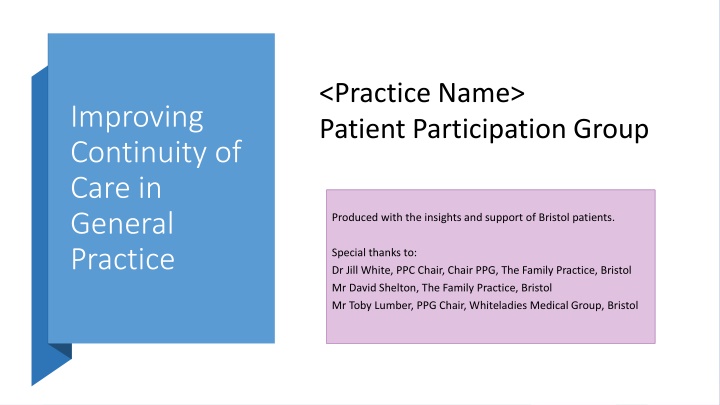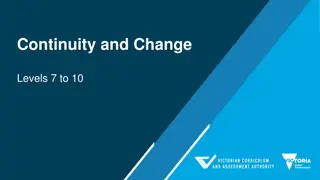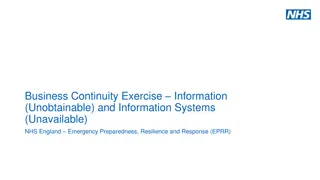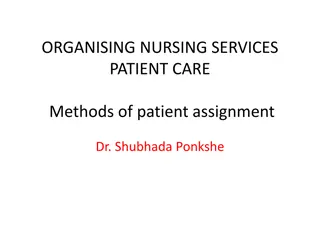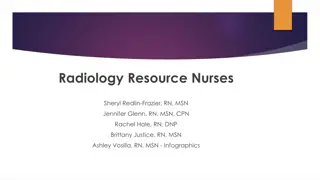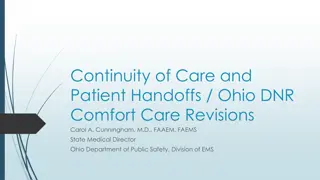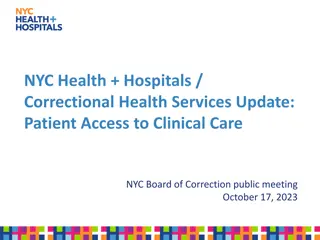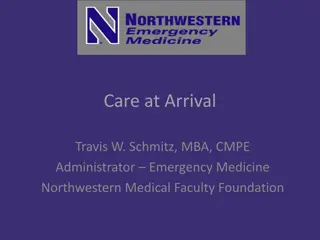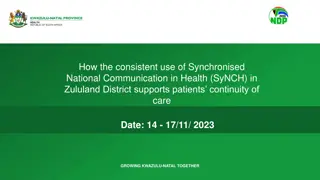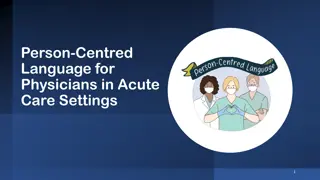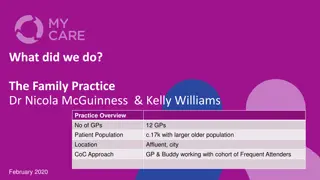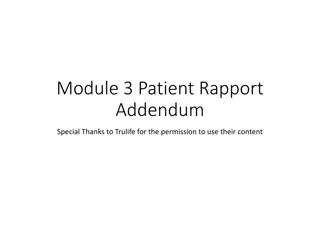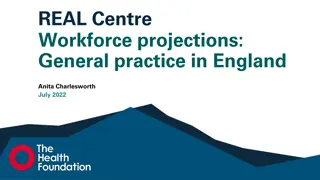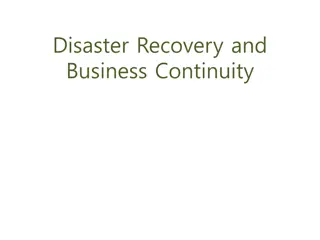Enhancing Patient Care Through Continuity in General Practice
Continuity of care in general practice is crucial for improving patient outcomes and experiences. Maintaining a consistent relationship with a GP or healthcare team leads to better medical adherence, enhanced doctor-patient relationships, reduced hospital visits, and overall improved health outcomes. Different types of continuity, such as relational, episodic, informational, and managerial, play important roles in coordinating patient care effectively. Emphasizing continuity of care benefits both patients and healthcare providers by fostering trust, satisfaction, and better health outcomes.
Download Presentation

Please find below an Image/Link to download the presentation.
The content on the website is provided AS IS for your information and personal use only. It may not be sold, licensed, or shared on other websites without obtaining consent from the author.If you encounter any issues during the download, it is possible that the publisher has removed the file from their server.
You are allowed to download the files provided on this website for personal or commercial use, subject to the condition that they are used lawfully. All files are the property of their respective owners.
The content on the website is provided AS IS for your information and personal use only. It may not be sold, licensed, or shared on other websites without obtaining consent from the author.
E N D
Presentation Transcript
<Practice Name> Patient Participation Group Improving Continuity of Care in General Practice Produced with the insights and support of Bristol patients. Special thanks to: Dr Jill White, PPC Chair, Chair PPG, The Family Practice, Bristol Mr David Shelton, The Family Practice, Bristol Mr Toby Lumber, PPG Chair, Whiteladies Medical Group, Bristol
What is continuity of care? Views of continuity of care Views of continuity of care A GP that has an overview of my healthcare David Shelton, Patient, Family Practice, Bristol Having a choice to wait and see my usual GP when they are free, or to see any GP if it feels urgent PPG Member, Whiteladies Medical Practice, Bristol Professor Sir Denis Pereira Gray, a GP and Patron of the National Association of Patient Participation Groups is clear on the importance of having continuity of care from a GP or a team. Sir Denis says "IfGPs can listen to patients stories, not just their symptoms, they will be able to do so much more You can listen to the BBC interview with Sir Denis here How would you define continuity of care?
Why is continuity important? A summary of the benefits of continuity of care A summary of the benefits of continuity of care Better medical outcomes More likely to take your medication Better relationship with doctors Less likely to go to hospital Improved longevity More likely to follow doctor s advice Less likely to use other services Better for doctors Reduced costs Nuffield Trust 2018 What is the experience of your members?
Types of continuity of care A practice may improve continuity of care using a variety of types A practice may improve continuity of care using a variety of types Relational Building good patient-professional relationships that benefit both the patient and the professional Episodic GP/team provide continuity of care during an episode of ill health Informational Good record keeping and information to help others to understand the patient and their conditions Managerial Co-ordinating a patient s care especially when a team of/many professionals are involved Are all types of CoC equally important?
What happens? This shows what happens when there is continuity of care This shows what happens when there is continuity of care Improves satisfaction Builds relationship Builds trust Better health outcomes Promotes adherence and self management No need to repeat the story Seeing the same GP Reduced costs Improves efficiency (time) More appropriate decisions e.g. reduced hospital admissions Awareness of patient s life context Better informed decisions Image reproduced with permission from Professor Chris Salisbury. This logic model explains why we think continuity might be important and how it exerts its effects is based upon: Salisbury C, Sampson F, Ridd M and Montgomery AA (2009) How should continuity of care in primary health care be assessed? British Journal of General Practice 59 (561): 134- 141. Available from: https://bjgp.org/content/59/561/e134 Can you think of any barriers to continuity?
Sometimes convenience more important than a relationship Patient barriers Perceived barriers from patients Perceived barriers from patients It's possible to have a relationship with more than one person What if it s a GP you don t want to see? More important to people with a story Barrier Response Why does seeing the same GP lead to better informed decisions? What if it s a GP you don t want to see? Patients can choose the GP they wish to see, providing the GP has capacity. As a practice you can change the field that holds Usual GP name to reflect this. More important to people with a story Everyone has a story, continuity of care is building up a picture of the patient and establishing trust with your GP. It's possible to have a relationship with more than one person Yes it is, many practice's share the care of their patients with colleagues either in Buddying to cover leave or Micro-teams when other professionals are involved. Sometimes convenience more important than a relationship Yes, if the condition is acute patients may need to see a GP sooner than they can see the GP they have continuity with, good informational continuity is important to support this. Why does seeing the same GP lead to better informed decisions? Continuity of care enables a GP to be responsible for a patient, rather than a patient circling around a number of GPs dealing with what is presented rather than the whole story.
Research & evidence The research into the benefits of continuity of care The research into the benefits of continuity of care When they receive continuity of doctor care, patients: When continuity of doctor care is provided, doctors: Baker and Streatfield (1995) Baker et al (2003) Adler et al (2010) Hjortdahl & Borchgrevink (1991) Hjortdahl (1992) Ridd et al (2011) Have an accumulated knowledge about the patient. Doctors use such accumulated knowledge both for diagnosis and to tailor their advice. Are more satisfied Warren et al (2015) Chen et al (2013) Are more likely to follow medical advice (adherence) Report that continuity enables them to provide a higher- quality care. GPs are then rewarded with more professional satisfaction through doing a better job. Ridd, Shaw, & Salisbury (2006) Are more likely to take up offers of personal preventive medicine O Malley et al (1997) Christakis et al (2003) Have improved problem recognition and quality of management for long term conditions Saultz and Lochner (2005) Are more likely to have a good doctor patient relationship with their GP Mainous et al (2001) Ridd et al (2011) Have reduced conflicts of responsibility , particularly reducing the collusion of anonymity where succession of clinicians only deal with what is immediately most pressing Freeman and Hughes (2010) O Connor et al (1998) Romano and Segal (2015) Are more likely to receive good quality of care Brousseauet al (2004) Van den Berg et al (2016) Are less likely to need to go to A&E Contribute to the reduced the use of specialist care, A&E, emergency admissions and outpatient appointments Hansen et al (2013) Katz et al (2015 ) Are less likely to need a hospital admission, particularly for ambulatory care sensitive conditions Barker et al (2017) Weiss and Blustein (1996) Saultz and Lochner (2005) Reduce costs e.g. prescriptions and tests Maarsingh et al (2016) Pereira Gray et al (2018) Are likely to live longer Reduce cases of avoidable significant harm Avery et al (2020) Have more cost effective healthcare (including meaning funding available for other things) Starfield (1994) Weiss and Blustein (1996)
Patient preferences What are the reasons behind patient preferences? What are the reasons behind patient preferences? Which factors influence a patient s preference for continuity? What are the characteristics of patients who prefer continuity? If their condition is physical or psychological Perceived acuity and severity or ambiguity of a clinical problem Prior relationship with a GP Systems and structures of general practice Age, sex, ethnicity, household income and education Older Affluent Not in full time work Have a long term or complex condition Have a mental health condition Trust in their GP Continuity of care and the patient experience by The Kings Fund (2010) Continuity of care and the patient experience by The Kings Fund (2010) Can you add any more?
Patient perspectives When, why and where is continuity important to patients? When, why and where is continuity important to patients? When is access more important than continuity? Patient seeking same day appointment for a child Patient has urgent physical condition Those who are employed are 6 times more likely to value choice of time Older patients will wait c. 2.5 days extra for an appointment with their GP of choice Why do patients value continuity? Not having to repeat their story Have a good level of trust with their GP Feel safe and listened to Feel treated with respect Feel their GP knows them Where is continuity important? All/some consultations at the practice All home visits All care homes Extracted from documents referenced on Suggested Reading and Research & Evidence Can you add or expand to these points?
Practice influences What factors in the practice influence continuity of care? What factors in the practice influence continuity of care? Patients: Some patients will benefit more from continuity - patients with long term conditions, frail, anxious, learning disabilities and carers. Some patients do not value continuity. Appointment Types: Routine, GP or nurse Conditions: Continuity for acute treatment over several weeks/months or for long-term condition patients Practice Staff: Staff culture, reception team encouraging continuity, matching patient with preferred GP gender, GPs welcome responsibility for a list of patients High Profile Support: Royal College of GPs, HealthWatch, the Health Foundation and ongoing research Patients Appointments Conditions Practice Staff Can you think of more examples for each factor?
Annual GP Patient Survey The GP Patient Survey provides a measure of continuity of care The GP Patient Survey provides a measure of continuity of care Add your practice data here. An example is given showing just over half (52%) of the patients who responded said they see or speak to their preferred GP Find your practice survey results at GP Patient Survey (gp-patient.co.uk The data is publicly available at
Approaches to continuity of care Practices need to answer these 2 questions: How will the practice team deliver continuity? One GP with overall responsibility for the patient Micro-Team (e.g. GP and GP Buddy or Multi-Disciplinary Team) responsible for patient Which patients will be part of continuity project? All patients Groups of patients What will determine which patients and how continuity is delivered at your practice?
System Challenges Challenges to continuity of care from the system Challenges to continuity of care from the system GP recruitment & retention is reflected in move towards continuity provided by a microteam e.g. a GP and a GP buddy GPs working part-time Practice Recruitment and workforce turnover personnel changes and unfilled vacancies Day-to-day pressures on resources make it hard to deliver (e.g., current pandemic) Practice Mergers focus on efficiency and targets Centralisation of services may reduce personalisation and continuity Patient information no one view of the patient, accessible across the providers NHSperformance targets focus on access not continuity of care Perception - continuity of care is often perceived as an administrative function by those outside the system but it a key reason doctors are attracted to general practice Any particular challenges for this practice?
Supporting the practice? How can the PPG and Practice support each other? How can the PPG and Practice support each other? PPG Support to the Practice Practice support to the PPG Establish direct communication between continuity of care lead at the practice and the PPG Canvas patient views patient surveys, waiting room interviews Promote continuity in your communications Provide updates to the PPG on the project Know the scope of the project e.g. which patients will benefit most from continuity of care Share results of the project
Suggested reading For those who would like to know more about continuity For those who would like to know more about continuity Continuity of care and the patient experience (kingsfund.org.uk) 2010 It explores why continuity is important in general practice, and what it looks like from both patient and staff perspectives. Improving access and continuity in general practice | The Nuffield Trust) ) 2018 A research summary covering practice and policy lessons. Improving continuity: THE clinical challenge (stleonardssurgery.co.uk) Great introduction for practices, uses summary tables on key points by Prof Sir Denis Pereira Gray. Continuity of care resources RCGP (2019) Provides a good overview on improving continuity in general practice.
